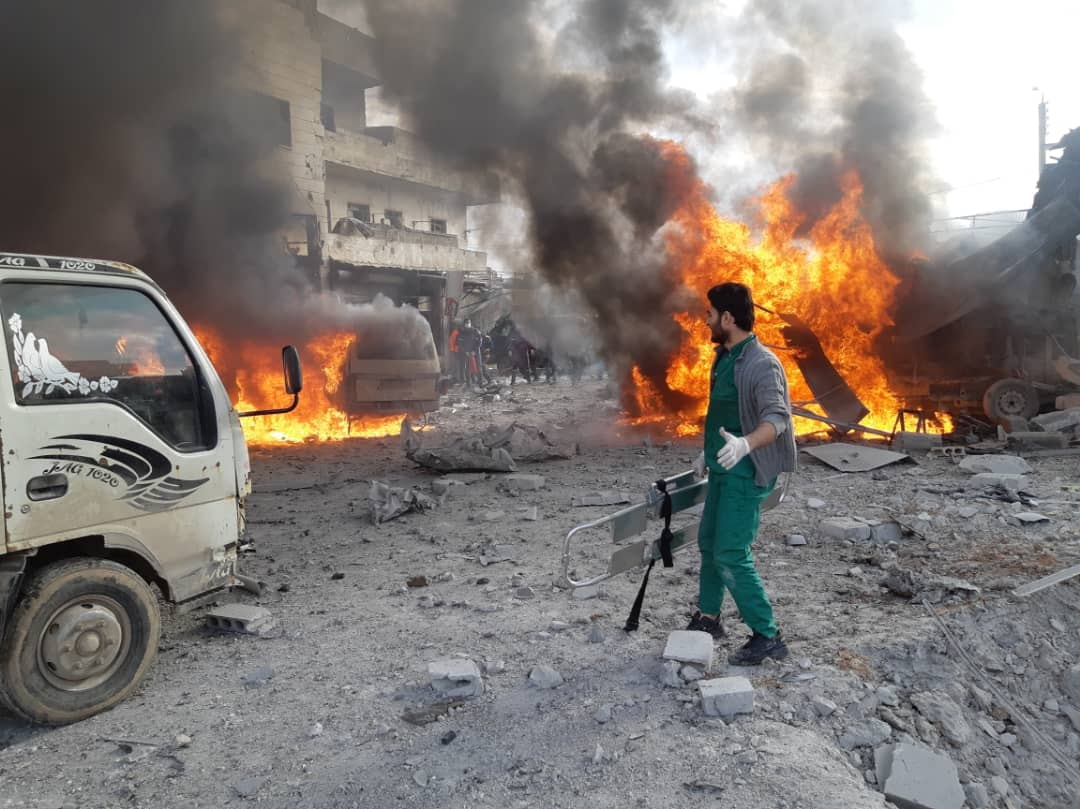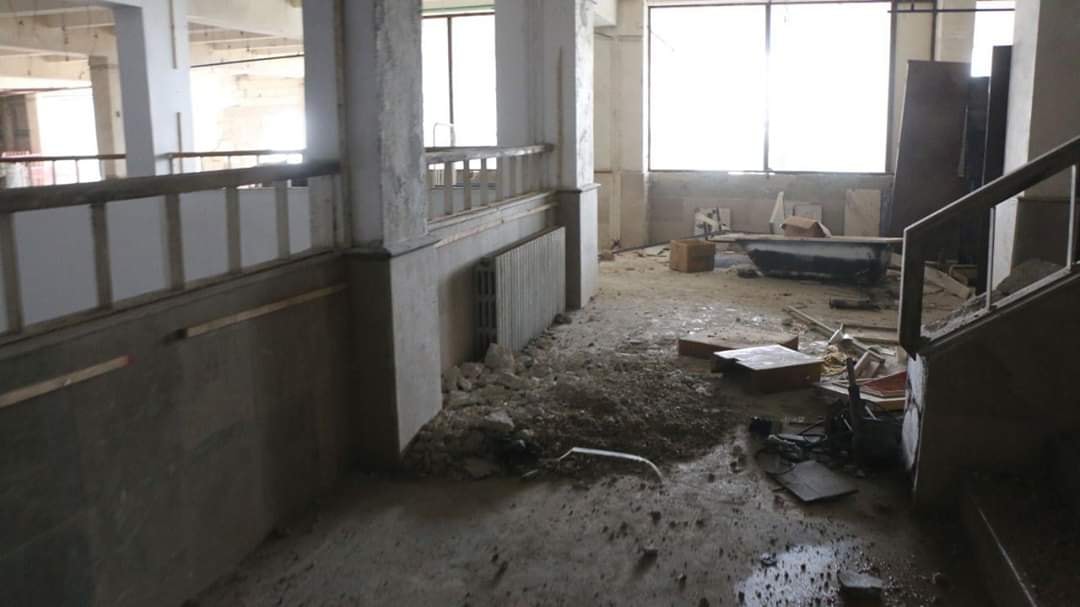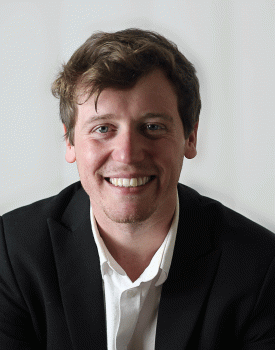Last week, Russian delegates to the UN Security Council notched a major victory for their ally Syrian President Bashar al-Assad, shepherding through an amended resolution on cross-border aid that threatens to cut off crucial lifelines of humanitarian support to Syria's northwestern province of Idlib.
Passing by a vote margin of 11-0 on January 10, the resolution curtails the number of border crossings open for aid. Despite Russian pressure to slash all cross-border humanitarian operations, the amended resolution instead reduced the number of international crossings to just two—both connecting Turkey with rebel-held Idlib—while two key crossings from Iraq and Jordan were closed.
First authorised in 2014, Resolution 2165 has been passed every subsequent year. However, the revised version now throws into doubt vital cross-border for the estimated three million civilians—including approximately 1.5 million Syrians displaced from across the country—still residing in what remains of Syria’s rebel-held northwest.
Their future is thrown further into doubt by the fact the Syrian government and its allies are currently advancing on rebel-held areas of Aleppo and Idlib provinces.
Some observers had originally expected the Syrian government to engage in some kind of limited offensive, aimed at reining in frontline attacks by hardline Islamist groups in control of Idlib, or securing control of two strategic highways running through the opposition enclave.
That offensive began in April.
However, it increasingly appears that the campaign may be aiming to make good on president Assad’s often repeated vow to retake “every inch” of Syria. Recent statements in pro-government media suggest that the offensive will continue, and advance on key Idlib towns including Maarat a-Numan and Saraqeb.
One key aspect of the pro-government offensive that began in April has been attacks on civilian infrastructure. Time and again, hospitals and aid workers in Idlib have been singled out and targeted in a campaign of brutal bombardments.
Mohamad Katoub, a consultant in humanitarian affairs advocacy in Syria, says that even the UN Security Council resolution was expected, it’s not a good sign for Idlib's already embattled medical sector.
“The new resolution will [place] more pressure on NGOs working in the north of Syria,” he says. “It’s only another six months with no guarantee of renewal.”
“It’s all about politics now.”
The Syrian government's allies have openly acknowledged that. Russian representative Vasilly Nebenzia, speaking at a recent press conference, cast the amended resolution as simply reflecting facts on the ground.
“The government of Syria is in control of the major part of the territory,” he said, adding that “in six months, we will see where we are, what has happened on the ground in Syria.”
Idlib’s medical sector has already been through a lot—weathering years of bombardment, volatile shifts in local control on the ground as well as underfunding. However, the recent UN resolution is not the only existential threat currently facing the sector. Aerial attacks by pro-government forces have intensified in recent months against hospitals and healthcare workers across rebel-held northwest Syria, as pro-government forces embark on a calculated final assault to retake the region’s last enclave of armed opposition. And with hardliners in control of much of Idlib, nervous western governments are increasingly slashing badly needed funds sustaining hundreds of hospitals there.

Targeting hospitals as ‘punishment’
Since the very beginning of the conflict, Syria has witnessed gross violations go international humanitarian law as hospitals and healthcare workers have been treated as a target of war.
According to US-based human rights NGO Physicians for Human Rights, over 348 medical facilities have been violently targeted since the outbreak of Syria’s armed conflict in March 2011, resulting in the deaths of over 900 medical personnel. Of those attacks, more than 90 percent can be traced to strikes by the Syrian government and its allies.
“There was a big change [then] in how hospitals were being attacked,” says Katoub. “Before, hospitals were targeted more as a type of punishment for operating outside of government areas.”
“Now, it’s a type of war tactic used to deprive entire communities of any kind of civil services.”
For a brief period, civilian infrastructure in Idlib had fallen under the protective umbrella of the Sochi Agreement, a ceasefire deal brokered in September 2018 between Russian President Vladimir Putin and Turkish President Recep Tayyip Erdogan. The agreement, announced just as pro-government forces were threatening a last-ditch offensive to retake Idlib from rebel groups, created a 15 to 20-kilometer protective “buffer zone” along frontlines in the northwest. Despite numerous violations, the deal was largely successful in holding off an all-out pro-government offensive to retake the region.
Over the past nine months however, that hard-won truce has largely fallen apart.
In April, pro-government forces unleashed their unprecedented campaign. Hundreds of medical facilities have repeatedly found themselves in the crosshairs since.
On one day alone last May, Russian warplanes struck four different hospitals in a coordinated campaign to eliminate medical centers across rebel-held territory. The targeted raids took place in spite of their inclusion on a UN-sponsored deconfliction list designed to alert pro-government forces of their presence and prevent collateral humanitarian damage.
The end result has been that tens of thousands of civilians across large swathes of Idlib no longer have access to adequate healthcare.
Since late last November, the entirety of Idlib’s southern countryside has been left without a single functioning hospital.
Further north, in the city of Maarat a-Numan, the Amara National Hospital is another example of a medical facility that has found itself under routine bombardments in recent months.
One of the largest hospitals left functioning in Syria’s northwest, the center hosts around 250 staff and, according to hospital director Radwan Shardoop, treats around 30,000 patients each month.
Despite its scale and resources, Shardoop says the facility has struggled to maintain continuous services, having been targeted with a total of 15 airstrikes.
“We are working under extremely difficult circumstances here,” he says. “We have been put out of service more than once, sustained heavy damage and lost a number of our colleagues to the bombing.”

Donor fatigue and fears of extremism
While the conflict has intensified in recent months, Idlib’s health facilities have been struggling with dwindling resources due to of a combination of donor fatigue and domestic political pressures that led many countries to reduce humanitarian aid budgets to northwest Syria.
In January last year, hardline Islamist group Hay’at Tahrir a-Sham (HTS), which evolved from an offshoot of Al-Qaeda’s Syria affiliate, lashed out against rival Turkish-backed rebel groups also present in Idlib. A HTS campaign in the early weeks of 2019 against rival faction Nour a-Din a-Zinki saw the dramatic collapse of the latter's forces, and resulted in the capture of around 60 percent of rebel-held territory in the northwest through a combination of military force and a series of negotiated withdrawals.
HTS has since capitalised on its military gains by extending the control of its associated governance arm, the Syrian Salvation Government, and now commands majority control of Idlib.
The perception of an extremist takeover has greatly complicated humanitarian efforts in this corner of Syria.
SAMS, which draws its funding from a combination of governmental grants and private donations, finances approximately 25 percent of health sector work in Idlib, according to Syria country director Mazen Kewara.
He says that the rise of HTS spooked some foreign governments, who in the past year have either diverted funds to other areas or cancelled humanitarian aid altogether.
According to Kewara, the German government responded to the HTS takeover by redirecting approximately 20 percent of their grants for SAMS’ work in Idlib—although he mentions that this did not affect health services directly, coming instead primarily out of administrative costs. However, the loss of funds has meant deep cuts to organizational structures that are critical for documentation and coordinating healthcare between regions.
“The governance of the healthcare sector is suffering from the lack of resources,” Kewara says. “Those resources were covering health information systems, drug controls and some central projects like medical waste management.”
“You can imagine how this would impact the ability of the health directorate to coordinate and oversee these activities,” he adds.
Among other countries, the US government has also made steep cuts to humanitarian aid in recent years. After ending stabilization funding for northwestern Syria in 2018, Washington pledged $397 million last March—a decline of $300 million compared with two years earlier.
The rise of HTS in Idlib has “affected humanitarian services there, and for sure that has increased the concerns of donors and increased risks to implementers in this area,” Kewara admits.
In the meantime, it appears the Syrian government plans to move ahead this year with a military conquest of the opposition’s last holdout region. Last week, Russia and Turkey announced the beginning of another—shortlived—ceasefire agreement, but Syrian forces continued airstrikes and artillery bombardments against various cites in the northwest almost immediately afterwards. Yet more civilians have been displaced as a result.
Maarat al-Numaan, one of the current focuses of pro-government bombardments, has reportedly almost emptied after much of the civilian population fled further north toward the Syrian-Turkish border.
With close to 350,000 people displaced across the province since December 1, according to UNOCHA estimates, adequate medical care has become a critical necessity for the displaced even as resources dwindle and administration working toward regional coordination bears the brunt of funding cuts.
With Russia expected to push hard for closure of Turkish aid crossings in six months’ time, Idlib’s healthcare sector has never looked in a more precarious position.




